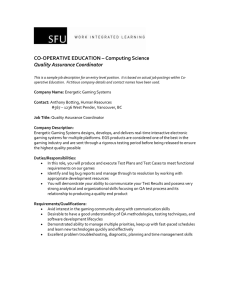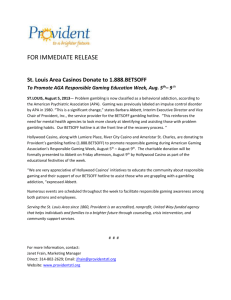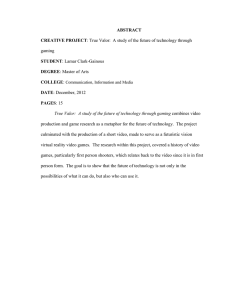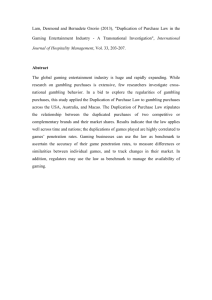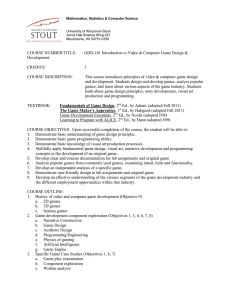PENNSYLVANIA: A NEW BILL, ANOTHER HEARING Law and Legislation
advertisement
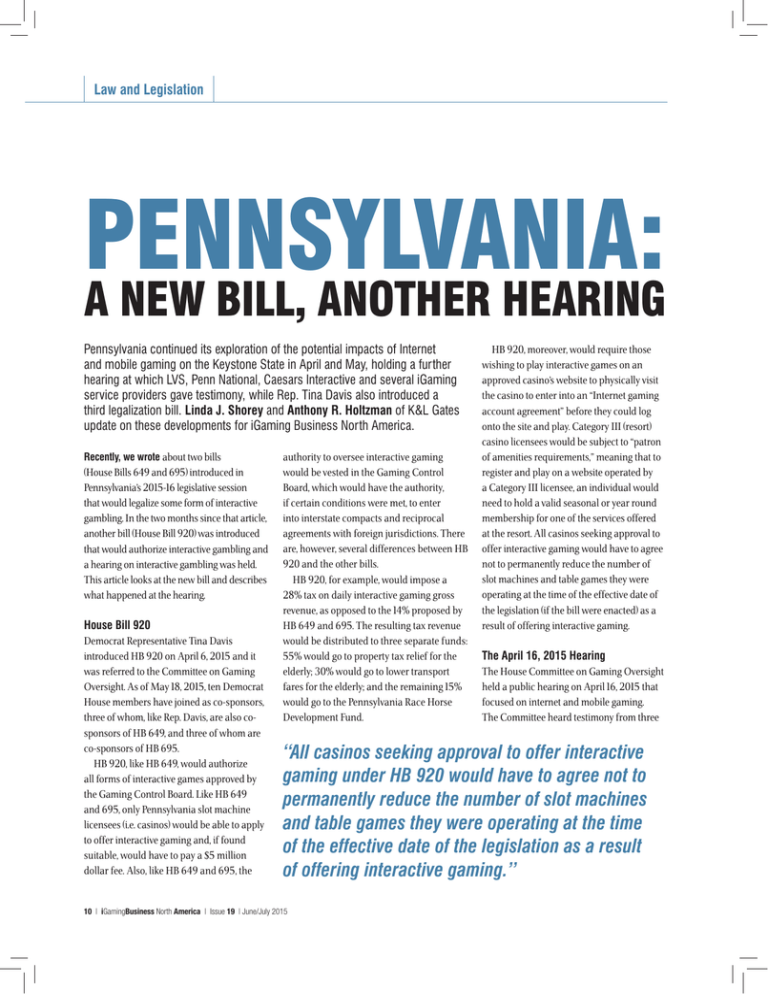
Law and Legislation PENNSYLVANIA: A NEW BILL, ANOTHER HEARING Pennsylvania continued its exploration of the potential impacts of Internet and mobile gaming on the Keystone State in April and May, holding a further hearing at which LVS, Penn National, Caesars Interactive and several iGaming service providers gave testimony, while Rep. Tina Davis also introduced a third legalization bill. Linda J. Shorey and Anthony R. Holtzman of K&L Gates update on these developments for iGaming Business North America. Recently, we wrote about two bills (House Bills 649 and 695) introduced in Pennsylvania’s 2015-16 legislative session that would legalize some form of interactive gambling. In the two months since that article, another bill (House Bill 920) was introduced that would authorize interactive gambling and a hearing on interactive gambling was held. This article looks at the new bill and describes what happened at the hearing. House Bill 920 Democrat Representative Tina Davis introduced HB 920 on April 6, 2015 and it was referred to the Committee on Gaming Oversight. As of May 18, 2015, ten Democrat House members have joined as co-sponsors, three of whom, like Rep. Davis, are also cosponsors of HB 649, and three of whom are co-sponsors of HB 695. HB 920, like HB 649, would authorize all forms of interactive games approved by the Gaming Control Board. Like HB 649 and 695, only Pennsylvania slot machine licensees (i.e. casinos) would be able to apply to offer interactive gaming and, if found suitable, would have to pay a $5 million dollar fee. Also, like HB 649 and 695, the authority to oversee interactive gaming would be vested in the Gaming Control Board, which would have the authority, if certain conditions were met, to enter into interstate compacts and reciprocal agreements with foreign jurisdictions. There are, however, several differences between HB 920 and the other bills. HB 920, for example, would impose a 28% tax on daily interactive gaming gross revenue, as opposed to the 14% proposed by HB 649 and 695. The resulting tax revenue would be distributed to three separate funds: 55% would go to property tax relief for the elderly; 30% would go to lower transport fares for the elderly; and the remaining 15% would go to the Pennsylvania Race Horse Development Fund. HB 920, moreover, would require those wishing to play interactive games on an approved casino’s website to physically visit the casino to enter into an “Internet gaming account agreement” before they could log onto the site and play. Category III (resort) casino licensees would be subject to “patron of amenities requirements,” meaning that to register and play on a website operated by a Category III licensee, an individual would need to hold a valid seasonal or year round membership for one of the services offered at the resort. All casinos seeking approval to offer interactive gaming would have to agree not to permanently reduce the number of slot machines and table games they were operating at the time of the effective date of the legislation (if the bill were enacted) as a result of offering interactive gaming. The April 16, 2015 Hearing The House Committee on Gaming Oversight held a public hearing on April 16, 2015 that focused on internet and mobile gaming. The Committee heard testimony from three “All casinos seeking approval to offer interactive gaming under HB 920 would have to agree not to permanently reduce the number of slot machines and table games they were operating at the time of the effective date of the legislation as a result of offering interactive gaming.” 10 | iGamingBusiness North America | Issue 19 | June/July 2015 Law and Legislation “Penn National’s Chris Sheffield testified in favor of Internet gambling, but opposed requiring individuals to open their Interactive gaming account in person at the casino because, he said, it would penalize the more rural casinos.” gambling is located. Mr. Pollock opined that interactive gaming should be tied to the land-based casino industry for the best results in terms of revenue and public policy objectives. The members asked each of them a couple of questions related to their areas of expertise. Factors weighing on legalization casino-related representatives and three representatives of companies that provide services related to interactive gaming. The casino-related representatives were Andy Abboud on behalf of the Las Vegas Sands Corporation; Chris Sheffield on behalf of Penn National Gaming; and Michael Cohen on behalf of Caesars Interactive Entertainment, Inc. Mr. Abboud testified in opposition to Internet gambling and HB 649. Members of the Committee questioned him vigorously about the Sands’ position with respect to Internet gambling, including questions about its use of mobile gambling at its Nevada casino and fines for underage individuals on the gaming floor at its Pennsylvania casino. Mr. Sheffield testified in favor of Internet gambling conducted by the Commonwealth’s licensed casinos, but opposed requiring individuals to open their Interactive gaming account in person at the casino because, he said, it would penalize the more rural casinos. The members also posed a number of questions to him, many of which were focused on the experience of New Jersey and the United Kingdom with interactive gaming. Mr. Cohen testified in favor of Internet gambling conducted by the Commonwealth’s licensed casinos and informed the Committee that interactive gaming could gross $307 million a year, which, at a 14% tax rate, would result in $43 million annually in tax revenue. The interactive-gaming company representatives were Kevin Mullally and Chad Kornett on behalf of Gaming Laboratories International, LLC; Lindsay Slater on behalf of GeoComply; and Michael Pollock on behalf of Spectrum Gaming Group. Mr. Mullally explained that GLI is the world’s largest technical testing laboratory and serves gaming regulatory agencies in over 450 jurisdictions, including regulators in all U.S. states with legal gaming and all U.S. tribal regulators. Mr. Kornett described the types of services GLI has provided in connection with interactive gambling. Ms. Slater testified about GeoComply’s geolocation technologies and said that, in New Jersey, they are accurate to within 46 meters of where the person doing the Nothing has changed in the last two months with respect to the factors that come into play when considering whether interactive gambling will be authorized in Pennsylvania in 2015. The factor that weighs perhaps most heavily in favor of legalizing Internet gaming in Pennsylvania remains the budget deficit that the Commonwealth once again faces. Linda J. Shorey and Anthony R. Holtzman are lawyers with K&L Gates LLP, an international law firm with 48 offices on five continents. Both are members of the firm’s Betting & Gaming Practice Group. Shorey is a general member of the International Masters of Gaming Law. They advise betting and gaming operators, suppliers, payment processors, advertisers, and others on gaming issues arising under US federal and state law. Email: linda.shorey@klgates.com and anthony.holtzman@klgates.com. iGamingBusiness North America | Issue 19 | June/July 2015 | 11

